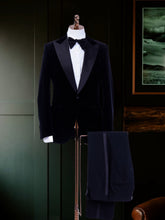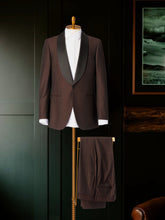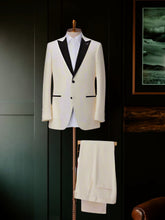How Beau Brummell’s Style Set the Standard for Modern Men
In today’s fashion world, the modern man’s suit stands as a symbol of sophistication, elegance, and professionalism. From the tailored suits that dominate boardrooms to sleek, minimalist designs on fashion runways, the men’s fashion landscape continues to thrive on timeless principles. Modern designers, such as Ralph Lauren, Tom Ford, and Giorgio Armani, build their collections on the same foundation that was set over two centuries ago. At the heart of this transformation lies one man—Beau Brummell, the pioneer of modern menswear, whose sartorial influence continues to shape the way men dress today.
Beau Brummell, an Englishman born in 1778, although not a designer, is widely considered the father of modern men’s fashion. His revolutionary ideas about tailoring, simplicity, and grooming laid the groundwork for what we now recognize as contemporary menswear. We will explore how Brummell's approach to men's style—from the introduction of tailored suits to the meticulous grooming standards—created the blueprint for today’s refined, well-dressed man.

-
Pioneer of Modern Menswear
Beau Brummell boldly moved away from the ornate, flamboyant clothing of the late 18th century. While his contemporaries in the Georgian era adorned themselves with excessive frills, lace, and vivid colors, Brummell introduced clean, understated designs that favored elegance over opulence. He revolutionized men’s fashion by focusing on simplicity, a vision that continues to influence today’s minimalist fashion trends.
One of Brummell's famous quotes, "To be truly elegant, one must be simple," encapsulates his approach to fashion. He made a deliberate decision to avoid the garishness that was so popular among the Georgian elite, opting for well-tailored garments that emphasized simplicity and sophistication. As one contemporary of his remarked, "He wore the most fashionable of clothes and yet made them seem effortless."
-
Focus on Simplicity
At a time when extravagance was the norm, Brummell pioneered minimalism in men’s fashion. His preference for dark, neutral tones such as black, navy, and gray in lieu of the bright, bold colors of earlier periods gave men’s fashion a sense of refinement and dignity. This minimalist approach helped define the modern man's wardrobe, where less is more, and subtlety speaks louder than flashiness.
Brummell famously rejected the highly embroidered and colourful clothing popular at the time. One contemporary observer commented on Brummell’s appearance: "He was not a peacock, but a true gentleman whose clothing was so restrained it looked almost inconspicuous." This was a direct challenge to the lavish fashion choices of his peers, setting a new standard that became synonymous with high-class style.
-
Introduction of the Modern Suit
Brummell is credited with introducing the precursor to the modern suit—a tailored coat, waistcoat, and trousers paired with an immaculate cravat. By opting for sharply tailored garments over voluminous, oversized clothes, Brummell’s style set the foundation for what we now recognize as the contemporary suit. Today, the well-tailored suit remains a symbol of class and professionalism, a direct descendant of Brummell’s groundbreaking designs.
Brummell is said to have once told the future King George IV, "A gentleman should never be overdressed, but he should always be perfectly dressed." This philosophy led him to promote a sharp, well-cut suit that would become the template for men’s fashion for generations.

-
White Linen Shirt Standard
Brummell placed a premium on cleanliness and grooming. One of his key innovations was the white linen shirt, which became a symbol of refinement. The shirt had to be starched and pressed perfectly, reflecting the high standards he set for personal grooming. The white shirt remains a staple in modern men’s wardrobes, essential for both business and formal occasions, and continues to represent the same level of sophistication that Brummell first championed.
Brummell’s dedication to cleanliness was so extreme that he is rumored to have spent several hours a day preparing himself before leaving his house. "The best-dressed men are not just those in the finest clothes, but those who take care to be clean and presentable," Brummell is often quoted as saying. This commitment to hygiene and precision set a new cultural norm for men’s grooming.
-
Innovator of Trousers
At a time when breeches and stockings were the norm, Brummell introduced full-length trousers (pantaloons) that became an essential part of the modern suit. By choosing trousers over the restrictive breeches, Brummell made an important statement about comfort and practicality, which continues to influence the design of men's clothing today. Whether it's formal trousers or smart-casual chinos, modern trousers owe their design to Brummell’s visionary approach.
Brummell’s decision to adopt trousers was initially met with criticism. Many considered them too daring, but Brummell, ever the trendsetter, responded, "A man must be comfortable in his clothes, for only then can he look truly elegant." This marked a pivotal shift in men’s fashion, replacing the constricting breeches with a more relaxed, practical option.
-
The Art of Tailoring
Brummell was a perfectionist when it came to tailoring. His garments were never baggy or ill-fitting; they were meticulously crafted to accentuate the natural shape of the body. The precise fit of his clothing emphasized the importance of tailored clothing—an influence that persists in modern fashion. Today, custom-tailored suits and bespoke tailoring remain at the forefront of luxury menswear, ensuring that the wearer’s silhouette is always enhanced.
Brummell once claimed, "A good coat should follow the lines of the body, but never cling to it." His devotion to achieving the perfect fit revolutionized tailoring, and his principles are still followed by Savile Row tailors and others around the world today.

-
Colour Palette
Brummell’s rejection of bright, garish colors in favor of dark, neutral tones reshaped the color palette for men's clothing. His preference for shades like black, navy, and gray became standard in men’s fashion, creating a timeless and versatile wardrobe. These colors remain dominant in modern menswear, from business suits to eveningwear, showcasing the enduring influence of Brummell's refined approach.
A fellow dandy of Brummell’s time noted, "Brummell made the black coat the uniform of every gentleman, stripping away the color and leaving behind the elegance of simplicity." This transformation in the approach to color is still visible in today’s corporate and formal dress codes.
-
Impeccable Grooming
Brummell was not only known for his fashion but also for his commitment to grooming. He set the standard for personal hygiene by promoting regular bathing and a clean-shaven appearance. His grooming routine, which included daily rituals for maintaining a neat appearance, changed the way men viewed self-care. Today, the grooming industry thrives, with men continuing to follow Brummell's example by maintaining a polished and sophisticated look.
It is said that Brummell would spend up to an hour each morning brushing his hair and shaving. "A gentleman’s true value is not just in his clothing, but in the care he takes with himself," Brummell famously said, underlining the importance of grooming.
-
The Dandy Movement
Beau Brummell’s influence gave birth to the "dandy" movement, which embraced elegance, refinement, and a meticulous attention to detail. The dandy was a man who used fashion as a means of self-expression, highlighting his personality through sophisticated and well-considered clothing. This movement shaped modern men’s fashion, encouraging a personal style that blends refinement with individuality—a core value still seen in today’s luxury menswear collections.
Brummell’s contemporaries were fascinated by his style. One admirer wrote, "He made fashion an art, and every detail—down to the precise knot of his cravat—was deliberate." His attention to detail became a hallmark of the dandy style, influencing not only his peers but also future generations.
-
Royal Connections and Social Influence
Brummell’s friendship with the future King George IV helped to cement his status as the arbiter of fashion in early 19th-century England. His influence extended far beyond the royal court, shaping the dress codes of the English aristocracy and the broader European fashion scene. Today, his royal connections still symbolize the intersection of fashion and social status, with high fashion continuing to set the tone for the elite and the influential.
Brummell’s relationship with the future King George IV is legendary. The king, known for his own fashion, once remarked, "Brummell is the only man I have ever met who understands fashion as I do." This mutual respect between the two men helped elevate Brummell’s influence in the social and fashion circles of his time.
-
Legacy of the Cravat
Brummell's intricate cravat style became the precursor to modern neckties. His focus on the perfect knot and the importance of neckwear set a standard for future generations of men. The cravat eventually evolved into the modern tie, which remains a key element of men’s formal and business attire. Brummell’s influence is evident in the simplicity and elegance of today’s neckties, which continue to follow the principles he established.
It’s said that Brummell’s cravat was so perfectly tied that it could be seen as a work of art. He once boasted, "The cravat should never be a mere accessory; it is the centrepiece of one’s attire." His obsession with the perfect knot led to the cravat’s evolution into the modern tie.

-
Cultural Impact
Though he never designed clothing, Brummell’s cultural impact is undeniable. His personal style, far more than the garments he wore, became the blueprint for modern fashion designers. His legacy lives on through designers like Tom Ford, Ralph Lauren, and others who cite Brummell’s influence in their work. His role as a fashion icon, rather than a designer, proves that personal style can be just as influential as the designs themselves.
Fashion historian Carlyle Reid once said, "Brummell didn't create fashion; he made it something to live for. His lifestyle was as much a part of the look as the clothes themselves." This encapsulates how Brummell’s influence transcended the physical garments, becoming a cultural phenomenon.
-
Enduring Influence
Beau Brummell’s principles of tailoring, simplicity, and grooming continue to define men’s fashion today. The emphasis on a sharp, clean fit, minimalistic design, and attention to detail are as relevant now as they were in the Regency period. Modern tailors and designers build upon Brummell’s vision to create collections that blend contemporary trends with the timeless principles he championed.
A modern-day tailor might still quote Brummell’s famous adage: "The perfect suit should always fit as if it were a second skin." This timeless principle underpins today’s bespoke tailoring industry, which continues to thrive due to Brummell’s pioneering ideas.
Beau Brummell’s influence on modern men’s fashion is undeniable. His innovative approach to tailoring, preference for simplicity, and commitment to personal grooming established the foundation for today’s sophisticated menswear. From the modern suit to impeccable grooming standards, Brummell’s legacy lives on in every tailored suit and every well-dressed man. His contributions continue to shape the way men dress, ensuring that his timeless style endures across generations.
As fashion icon Ralph Lauren once remarked, "A well-dressed man is a reflection of Beau Brummell’s timeless ideal—elegance, simplicity, and precision." Today’s fashion is as much a tribute to Brummell’s vision as it is a testament to the lasting power of his influence.












